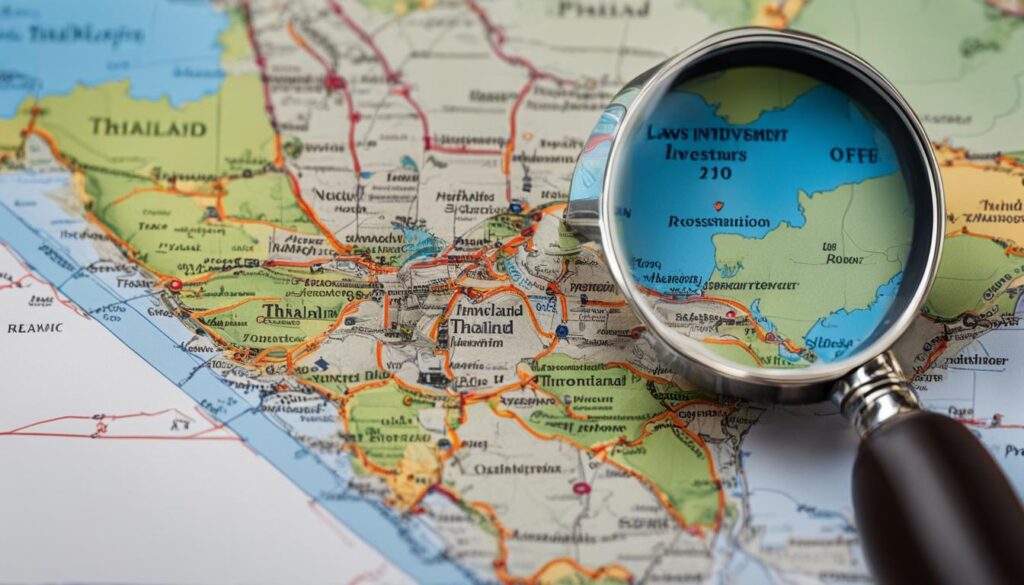Discover essential tips on navigating Thai legal system with our guide on important Thai laws for holidaymakers to ensure a safe, enjoyable trip.
Approximately 40% of foreigners residing in Thailand may be unaware of the intricacies of local legislation impacting their stay. As Thailand’s lure continues to enthrall expatriates and tourists alike, it becomes imperative to navigate the web of Thai visa requirements for foreigners, thai business laws for foreigners, tax laws for foreigners in Thailand, and thai criminal laws for foreigners. Whether planning to tie the knot under Thai marriage laws or simply seeking sunnier climes, understanding these legal frameworks is non-negotiable for a tranquil sojourn or successful business venture in the Kingdom.
Key Takeaways
- Familiarize yourself with visa requirements specific to your nationality for a trouble-free entry into Thailand.
- Understand local business regulations to ensure legal compliance when engaging in trade or commerce.
- Stay informed on tax obligations to avoid penalties and ensure financial legality as a foreign resident or worker.
- Be cautious of actions and behaviors that could possibly infringe upon Thai marriage and criminal laws.
- Always carry identification and respect the cultural and legal norms pertaining to the Thai monarchy.
Understanding the Thai Legal System for Foreigners
When you step into the Kingdom of Thailand, you are entering a realm that uniquely blends ancient traditions with modern legal frameworks. The Thai legal system is a complex tapestry reflecting the nation’s identity as a constitutional monarchy. For foreign visitors and residents alike, it is paramount to understand the crucial elements and nuances of the local laws to ensure a harmonious and legal stay within the country.
The Structure of Thai Governance
In navigating through Thailand’s legal corridors, one will first encounter the structural pillars that uphold its governance. Powerful and culturally ingrained, these pillars are entrenched in the country’s constitution, which delineates the separation of powers among the executive, legislative, and judicial branches—all under the symbolic umbrella of the monarchy.
Constitutional Monarchy and the Role of the Royal Family
The monarch’s position in Thailand is not just ceremonial; it bears profound cultural influence, with King Maha Vajiralongkorn revered as the nation’s moral compass and a symbol of unity. The respect for Thai royalty is woven into the very fabric of daily life and law, illustrated by the nation’s staunch lese-majeste laws. These laws represent a critical area where the rights and responsibilities of Thai citizens and foreigners intersect, emphasizing a deep-rooted veneration for the Royal Family.
Foreigners residing in or visiting Thailand must be keenly aware that their rights in Thailand are also bound by obligations, notably the obligation to refrain from any actions or speech that could be interpreted as disrespectful to the monarchy. Understanding these unique cultural and legal aspects is essential in avoiding the severe penalties that come with infringements of the lese-majeste statutes.
| Key Legal Consideration | Description | Implications for Foreigners |
|---|---|---|
| Constitutional Monarchy | Thailand’s system of governance, with the King as the Head of State. | Foreigners must respect the monarchy and avoid critique. |
| Lese-Majeste Laws | Laws protecting the dignity of the Royal Family, prohibiting defamation or insult. | Non-compliance can lead to criminal charges and severe penalties. |
| Cultural Respect | The expectation to honor Thai customs and traditions. | Adherence ensures societal acceptance and avoids legal consequences. |
| Legal Rights | Legal protections provided within the framework of Thai law. | Understanding one’s rights is crucial for legal recourse and fair treatment. |
Navigating the Thai legal system is an intricate dance that requires foreigners to move with respect and awareness, particularly regarding the deeply-rooted traditions surrounding the monarchy. The information provided is not only critical to legal conformity but serves as a bridge to cultural understanding—an essential component for anyone looking to build a life or simply enjoy their time in the Land of Smiles.
Respect for the Monarchy: A Must for All Visitors
The Thai Royal Family is held in high esteem within Thailand, and as such, the country’s lese-majeste laws reflect the critical importance of showing respect to the Thai monarchy. For foreigners, understanding and abiding by these laws are not just cultural niceties, but a matter of legal necessity. Violations can lead to severe repercussions within the criminal justice system in Thailand.
In order to maintain the dignity of the monarchy, visitors are expected to act with a certain decorum at all times. Public displays of respect, such as standing for the Royal Anthem or participating in national ceremonies, are more than traditions; they are viewed as obligations. Criticizing or defaming the monarchy — even inadvertently — can have drastic consequences, including imprisonment.
Remember: Freedom of speech does not extend to the defamation of the Thai monarchy. It’s always better to err on the side of silence than to express a disparaging opinion.
Below is a snapshot of guidelines to help visitors navigate the cultural expectations surrounding the Thai Royal Family:
| Do’s | Don’ts |
|---|---|
| Stand during the royal anthem in cinemas or public events. | Make critical remarks about the Royal Family, even in private. |
| Participate in moments of silence or homage-paying if occurring. | Ignore national ceremonies or gestures of respect. |
| Be conscious of how the monarchy is discussed or depicted on your social media platforms while in Thailand. | Share or like content on social media that could be seen as disrespectful. |
Adhering to these guidelines not only ensures a respectful visit but also guards against the legal ramifications of the lese-majeste laws. Whether in personal conversations or digital communication, discretion and reverence towards the Thai Royal Family must always be practiced.

Important Thai Laws For Holidaymakers
When visiting Thailand, some important Thai laws for foreigners are essential to keep in mind to ensure a trouble-free vacation. Firstly, Thai immigration law no longer requires a pass for entry as of July 2022. However, one must still be mindful of the specific visa requirements, which vary according to nationality. Notably, exceeding the duration of your legally permitted stay could lead to serious consequences including fines or detention. Therefore, keeping your travel documents up-to-date is critical.
Foreigners should also understand the nuances of Thai property laws. Acquiring property in Thailand comes with a unique set of regulations tailored to non-nationals. Consulting with a local legal advisor before proceeding with any property transactions is always advisable. As for Thai healthcare regulations, tourists should be aware of the mandatory health insurance for certain types of visas. It is important to carry documentation of such insurance to avoid repercussions.
- Avoiding illicit substances and respecting the legal drinking age of 20
- Adherence to the strict royal guidelines by avoiding defamatory remarks about the monarchy
- Ensuring travel documents are current and having proof of identity at all times
Moreover, Thai traffic laws for foreigners indicate that visitors should hold a valid international driving permit along with their native driving license when renting or driving a vehicle. Thailand has strict DUI regulations, and traffic violations can result in heavy fines or legal action.
Remember, a pleasurable stay in Thailand hinges on respecting the local laws and customs, keeping these guidelines in mind will help secure a joyful and legal holiday experience.
Navigating Immigration and Visa Regulations in Thailand
Thriving as a hub of culture and tourism, Thailand has specific immigration laws and visa regulations that apply to non-nationals seeking to enter the kingdom. Whether for leisure, work, or permanent relocation, understanding Thailand’s immigration requirements is essential for a seamless travel experience. The nation’s policies on visas hinge on one’s country of origin, purpose of visit, and intended duration of stay. Consequently, ensuring that you are up-to-date with the latest Thai visa regulations can help avoid unexpected hurdles upon arrival.
Current Thai Visa Requirements for Various Nationalities
As the world adjusts to the evolution of international travel standards, Thailand has tailored its entry protocols to facilitate a secure yet welcoming environment for visitors. While regulations fluctuate based on global health and security considerations, there are fundamental Thailand immigration laws that tourists and expatriates must comply with regardless of nationality. Most importantly, one should confirm whether a visa is required prior to booking travel arrangements, as this can vary dramatically between different countries.

For many travelers, a visa on arrival or a tourist visa will suffice for short-term stays. However, for those contemplating longer stays or employment in Thailand, obtaining the appropriate visa and meeting Thai work permit requirements is mandatory. This includes having proper documentation, such as work contracts and letters of invitation from Thai employers. Moreover, for those looking to extend their stay, it’s advisable to apply for visa renewals or extensions well in advance to avoid any complications.
Understanding the Consequences of Overstaying Your Visa
Remaining in Thailand beyond your visa expiry date is taken seriously under immigration laws in Thailand. Travelling without a valid visa stands to not only tarnish your travel record but could also subject you to substantial fines. For each day you overstay, there is a set penalty, and these fines can accumulate quickly. Prolonged overstays can result in more severe measures, such as detention, deportation, and even being barred from re-entering Thailand for a certain period. It is, therefore, critical to be mindful of your visa expiry date and adhere to the stipulated timeline, seeking extensions if necessary.
Foreign nationals planning to immerse themselves in the rich cultural tapestry of Thailand should prioritize staying abreast of the Immigration Bureau’s notifications and international travel advisories. By doing so, they ensure their journey to and stay in Thailand aligns seamlessly with the local legal framework governing international arrivals. Regular consultations with the Thai Board of Investment and the Ministry of Foreign Affairs websites can provide updated guidance regarding thai visa regulations and immigration laws.
Respecting Thai Customs and Culture: Legal Implications
Exploring the vibrant nation of Thailand can be an enriching experience, but it’s crucial that visitors align with the local customs and legal regulations. Familiarizing oneself with the Thai visa guidelines for foreigners is just the beginning. Grasping the investment regulations for foreigners in Thailand, as well as understanding the nuances of Thai marriage laws, Thai business laws, and Thai healthcare regulations are fundamental steps to ensure a legally untroubled visit or long-term stay.
Actions that western visitors may perceive as benign could carry significant legal consequences within Thailand. For instance, casual attire could be a misstep, since driving without a shirt is looked down upon and can be penalized. Likewise, the seemingly minor act of stepping on Thai currency – bearing the image of the revered monarchy – can be construed as a sign of disrespect and lead to legal issues.
- Always carry appropriate clothing to cover shoulders and legs when visiting temples or sacred sites.
- Never touch someone’s head or point your feet at people or religious objects – it is considered extremely disrespectful.
Cultural sensitivity extends into personal conduct too. The use of a microphone to address a public audience in any language other than Thai without proper permissions may result in incarceration, emphasizing the importance of understanding and complying with Thai business laws. Moreover, Thailand has stringent restrictions related to the removal and exportation of Buddha statues. Such items are considered sacred, and their movement is tightly controlled.
Pivotal for those planning longer-term stays or seeking entrepreneurship opportunities, a thorough grasp of investment regulations for foreigners in Thailand is indispensable. From property acquisition to opening a business, compliance with these specific regulations is non-negotiable to ensure smooth operations free from legal entanglements.
Thai marriage laws and family codes necessitate a comprehensive understanding as relationships progress into formal commitments. Marrying a Thai citizen will introduce foreigners to an entirely different facet of Thai law, from prenuptial agreements to marital property arrangements.
Additionally, Thai healthcare regulations may differ greatly from those in other countries, and foreigners should acquaint themselves with these policies. Whether you’re a tourist requiring emergency health services or an expatriate seeking regular medical care, knowing your rights and responsibilities under Thai healthcare laws is essential.
- Obtain comprehensive insurance that covers healthcare in Thailand.
- Be aware of the healthcare facilities near your residence or travel destinations.
Ultimately, embracing Thai traditions and regulations not only ensures a visit free from unwelcome surprises but also enhances the overall cultural experience. It’s about more than merely following rules; it’s about showing respect for the unique tapestry of Thai life that so graciously welcomes countless visitors each year.
Laws Surrounding Property and Investments in Thailand
Thailand, with its vibrant culture and dynamic economy, is a magnet for foreigners looking to invest in property and businesses. However, it is essential to navigate the landscape with a clear understanding of the property laws for foreigners in Thailand, ensuring compliance and securing investments.

The framework for property ownership rights for foreigners in Thailand is quite distinct from what many might be used to. With freehold ownership generally restricted, alternatives such as leaseholds and condominium purchases under foreign quota systems are valuable options. Investment in property often requires partnering with Thai nationals or investing in approved projects, which necessitates due diligence and an informed approach.
Discussing the investment laws for foreigners in Thailand, it’s important to highlight the generous incentives offered by the Board of Investment. They offer various tax breaks and ownership rights to foreigners, reflecting Thailand’s openness to boosting its economy through foreign expertise and capital.
For those looking to establish or operate a business, understanding business regulations in Thailand is vital. The Civil and Commercial Code provides a structural basis, but there can be additional layers of regulation depending on the type of business. This might include specific licenses and adherence to local administrative practices.
- Real Estate: Familiarize with the intricacies of leasehold arrangements and the Condominium Act.
- Business Operations: Comprehend the Foreign Business Act, which dictates what business activities are permissible.
- Investment: Utilize Thailand’s Board of Investment (BOI) promotions for preferential treatment and benefits.
It’s important for foreign investors to recognize that engaging with local legal expertise can pave the way for fruitful property acquisitions and business ventures, mitigating the risks tied to non-compliance of Thai laws.
Working Legally in Thailand: Permits and Labor Laws
Navigating the work permit requirements and labor laws is a critical step for expatriates seeking to work legally in Thailand. One must be well-versed with the work permit regulations in Thailand and the thai labor laws for expatriate workers to ensure a smooth professional journey in the country. Moreover, understanding the complexities of the tax laws for expatriates in Thailand is essential in managing financial obligations effectively.
Work Permit Requirements for Expatriates
Obtaining a Thai work permit is contingent upon various factors including the applicant’s nationality, job type, and qualifications. Regulations are stringent, and a job offer from a Thai employer is often a prerequisite. Here’s an outline of the work permit process:
- Secure a job offer from a Thai employer.
- Compile necessary documents, such as passport, non-immigrant visa, and certificates of employment.
- Submit the application through the employer to the Ministry of Labour.
- Pay the work permit fee upon approval.
Thai Labor Laws Affecting Foreign Workers
The labor laws in Thailand define the rights and duties of foreign workers, which transcend various aspects of employment, including minimum wage, working hours, and leave entitlements. Expatriates must comply with these regulations:
| Labor Law Component | Description |
|---|---|
| Working Hours | Not exceeding 8 hours a day or 48 hours a week, depending on the job type. |
| Holiday Leave | Minimum of 13 public holidays per year plus 6 vacation days after one year of service. |
| Sick Leave | Up to 30 days of paid sick leave per year. |
| Maternity Leave | 90 days of maternity leave, including 45 days of paid leave. |
| Severance Pay | Varies based on duration of employment, ranging from 30 days to 400 days’ worth of wages. |
Respecting and adhering to the work permit regulations and labor laws are paramount. Compliance ensures that foreign workers in Thailand remain within the legal framework, thus fortifying their rights and presence in the Thai workforce. Diligent attention to these details goes a long way in cultivating a successful and hassle-free career in Thailand for expatriate employees.
Conclusion
Navigating the Thai legal system is a sophisticated journey filled with important nuances that every foreigner must understand and respect. The landscape is diverse, requiring non-nationals to keep abreast of not only the Thai visa requirements for foreigners and tax laws for foreigners in Thailand, but also the specific norms that reflect the country’s deep-rooted cultural traditions. Realizing the significance of these regulations, from the very moment of stepping into Thailand, is central to ensuring a hassle-free stay, whether it is for leisure or business.
Adherence to the important Thai laws for foreigners cannot be overstated. At the core of a smooth experience is the respect for the monarchy, which is integral to Thai national identity, alongside compliance with laws pertaining to immigration, property ownership, and labor. It is this compliance that reinforces the security and privileges of living or doing business within this vibrant nation. Expatriates and holidaymakers alike must recognize that understanding business regulations in Thailand is crucial to fostering successful ventures and harmonious relations in this Southeast Asian hub.
In essence, whether your aim is exploration or entrepreneurship, the ground rule remains the same: meticulous attention to legal details promises an enriching Thai experience. By staying informed and respectful, visitors can immerse themselves in the wonders of Thailand’s rich heritage and dynamic economy without undue concern, making every moment in the Land of Smiles both memorable and lawful.
FAQ
What are some key Thai laws that foreigners must be aware of?
Foreigners in Thailand should be particularly mindful of laws regarding visas, business operations, taxes, marriage, and criminal behavior. One must comply with the thai visa requirements for foreigners, understand thai business laws for foreigners, adhere to tax laws for foreigners in Thailand, respect the thai marriage laws, and avoid actions criminalized under thai criminal laws for foreigners.
How is the Thai legal system structured?
Thailand operates under a constitutional monarchy system, which means there’s a blend of democratic governance with a hereditary monarch, who is revered. The legal system includes various levels of courts and adheres to a codified set of laws. Foreigners are expected to respect the monarchy, with strict lese-majeste laws protecting the royal family’s dignity.
Why must visitors respect the Thai monarchy?
The monarchy in Thailand is highly respected and protected by lese-majeste laws. Disrespectful actions or remarks about the Royal Family can result in severe legal consequences, including imprisonment. Adherence to these laws is a must to ensure a foreigner’s rights in Thailand are not jeopardized.
What are some important Thai laws for holidaymakers to consider?
Holidaymakers should be versed in the thai immigration law and ensure their visas are in order. They must abide by thai property laws for foreigners if interacting with the real estate market, and familiarize themselves with thai healthcare regulations and thai traffic laws for foreigners to navigate day-to-day scenarios lawfully.
What are the current Thai visa requirements for various nationalities?
Thai visa requirements can differ significantly based on one’s nationality. The requirements range from visa exemptions to visa-on-arrival or the need to secure a visa before entering Thailand. It’s crucial to check the most up-to-date information from Thai embassies or the Ministry of Foreign Affairs website pertaining to your specific country.
What happens if I overstay my visa in Thailand?
Overstaying your visa can lead to hefty fines, detention, and potential bans from re-entering Thailand. The penalties vary, depending on the length of the overstay, so it is imperative to leave the country before the visa expires or seek an extension from an immigration office where eligible.
How do Thai customs and culture impact legal matters?
Thai culture heavily influences the legal system and, consequently, the laws reflect widespread societal values. Disrespect towards cultural norms can have legal repercussions. These range from the way one behaves in public to compliance with investment regulations and legal processes surrounding marriage and business practices.
What do foreigners need to know about property and investment laws in Thailand?
Foreigners face restrictions when it comes to property and investment in Thailand. For instance, they generally cannot own land but can purchase condominiums under certain conditions. Investment laws also dictate the types of business activities foreigners can engage in and often require Thai majority ownership, unless investment privileges are granted under special schemes like the Board of Investment (BOI).
What are the work permit requirements for expatriates in Thailand?
Expatriates must have a job offer or a business interest in Thailand to apply for a work permit. The employer or business entity typically sponsors the application, which must align with the occupation’s specified criteria. A non-immigrant visa is a prerequisite for a work permit, and there are other documentation and qualification requirements.
How do Thai labor laws affect foreign workers?
Thai labor laws set forth rights and obligations for both employers and employees, including foreign workers. These laws regulate working hours, conditions of employment, leave, and severance pay, among other aspects. Foreign workers are also subject to tax laws for expatriates in Thailand, which dictate income tax obligations based on residency status and income earned within the country.






Leave a reply